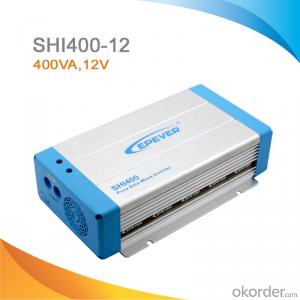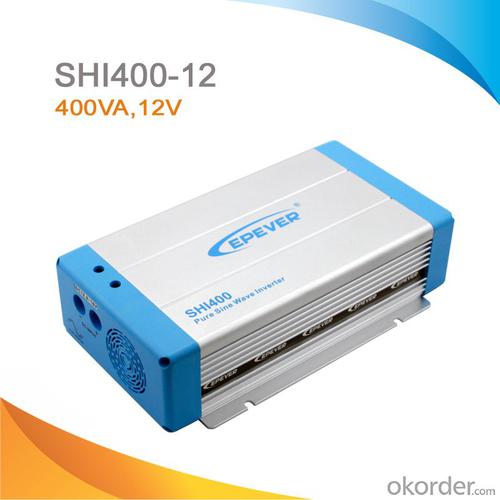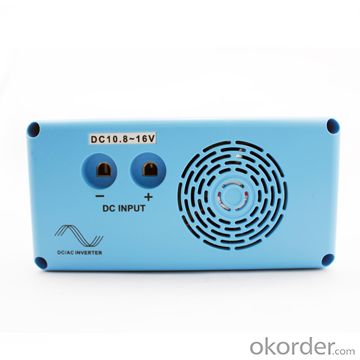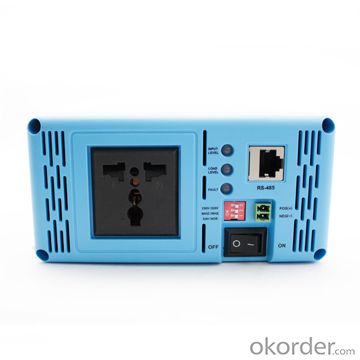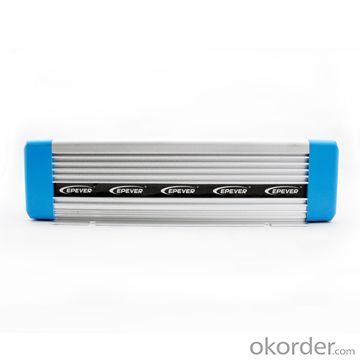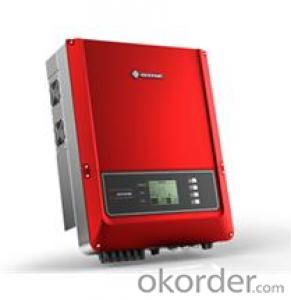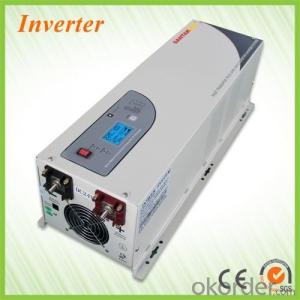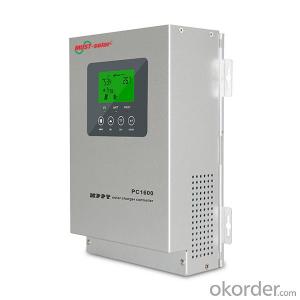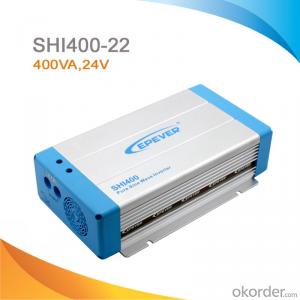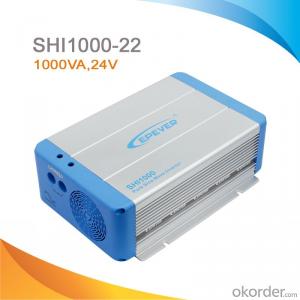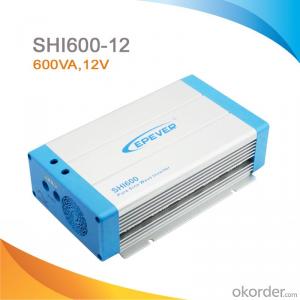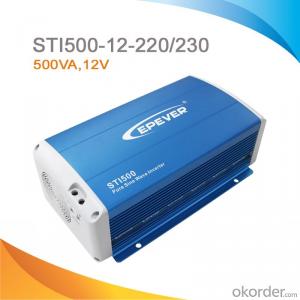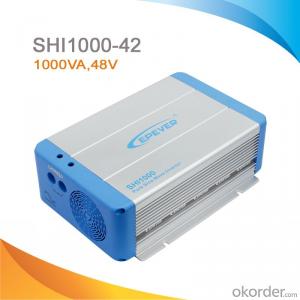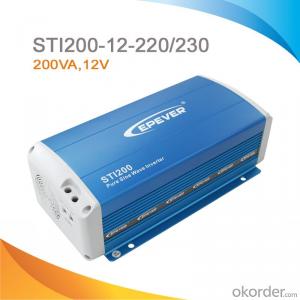Chinese Solar Inverter SHI 400W Pure Sine Wave Inverter/Power Inverter DC-AC, DC/AC Inverter, DC 12V to AC 220V/230V, SHI400-12
- Loading Port:
- China Main Port
- Payment Terms:
- TT or LC
- Min Order Qty:
- -
- Supply Capability:
- -
OKorder Service Pledge
OKorder Financial Service
You Might Also Like
Description
SHI series is a pure sine wave inverter which can convert 12/24/48Vdc to 220/230Vac 50/60Hz based on full digital and intelligent design. It features high reliability, high efficiency, concise outline, small volume, easy installation and operation. The inverter can be applied in many fields, such as household appliances, electric tools and industrial devices etc, especially for solar photovoltaic power system.
Features:
·Input & output fully isolation
·Adoption of advanced SPWM technology, pure sine wave output
·Dynamic current loop control technology to ensure inverter reliable operation
·Wide DC input voltage range
·The output voltage and frequency can be switched
·Low output harmonic distortion(THD≤3%)
·LED indicators for input voltage range, load power range, normal output & failure state
·Optional energy saving mode
·Wide working temperature range (industrial level)
·Continuous operation at full power
Protections:
·Output short circuit protection
·Overload protection
·Input low voltage protection
·Input over voltage protection
·Overheating protection
·Inverter abnormal protection
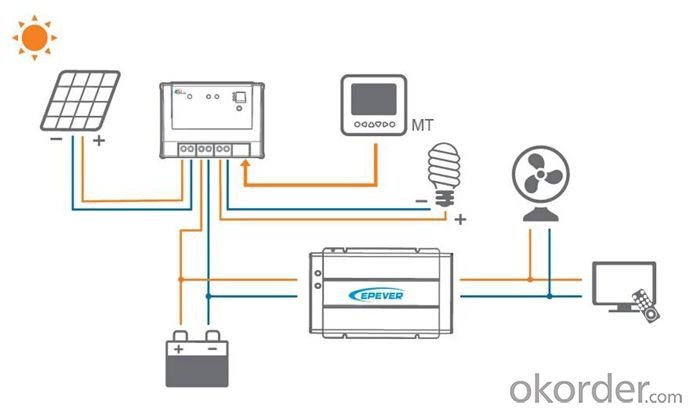
Specification:
Types | SHI400-12 | SHI400-22 |
Nominal Battery Voltage | 12V | 24V |
Input Voltage Range | 10.8~16Vdc | 21.6~32Vdc |
No Load Current | ≤0.8A | ≤0.45A |
Output Wave | Pure Sine Wave | |
Output Voltage | 220Vac±3% / 230Vac±10% | |
Continuous Power | 400W | |
Power 10 sec | 600W | |
Power 1.5 sec | 800W | |
Surge Power | 900W | |
Frequency | 50/60Hz±0.2% | |
Distortion THD | ≤ 3% (resistive load) | |
Efficiency at Rated Power | ≥91% | ≥92% |
Max. Efficiency | ≥92% | ≥93% |
Terminal | 16mm2 | |
Dimensions | 280×166×74.3mm | |
Installation | 150×158mm | |
Hole Size | Φ5mm | |
Net Weight | 1.8kg | |
Working Temperature | -20℃~ +50℃ | |
Storage Temperature | -35℃~ +70℃ | |
Humidity | < 95% (N.C.) | |
Altitude | < 5000m(Derating to operate according to IEC62040 at a height exceeding 1000m) | |
Insulation Resistance | Between DC input terminals and metal case: ≥550MΩ; Between AC output terminals and metal case: ≥550MΩ. | |
Dielectric Strength | Between DC input terminals and metal case: Test voltage AC1500V, 1 minute Between AC output terminals and metal case: Test voltage AC1500V, 1 minute | |
FAQ
Q1:Can we visit your factory?
A1:Sure,welcome at any time,seeing is believing.
Q2:Which payment terms can you accept?
A2:T/T,L/C,Moneygram,Paypal are available for us.
- Q: How efficient are solar inverters?
- Solar inverters are highly efficient, with most modern models achieving efficiency levels above 95%. This means that they can convert a large majority of the direct current (DC) electricity generated by solar panels into alternating current (AC) electricity for use in homes or businesses. The high efficiency of solar inverters helps maximize the overall energy output and financial benefits of solar power systems.
- Q: What is the efficiency of a solar inverter?
- The efficiency of a solar inverter refers to the percentage of solar energy that is converted into usable electricity. It is an important factor as higher efficiency means more energy is produced, reducing the overall energy loss. The efficiency of a typical solar inverter ranges from 95% to 98%, with some advanced models even surpassing 99%.
- Q: Can a solar inverter be integrated with smart home systems?
- Yes, a solar inverter can be integrated with smart home systems. Smart home systems are designed to connect and control various devices in the home, including solar inverters. By integrating a solar inverter with a smart home system, homeowners can monitor and control their solar energy production, consumption, and storage, as well as optimize energy usage based on real-time data. This integration allows for greater efficiency, convenience, and cost savings in managing solar power within a smart home ecosystem.
- Q: Can a solar inverter be used in areas with high temperature fluctuations?
- Solar inverters can generally be used in areas that experience high temperature fluctuations. These inverters are designed to function within a wide temperature range, usually between -20°C to 50°C (-4°F to 122°F), depending on the model. They incorporate temperature protection mechanisms to guarantee their durability and functionality, even in the face of extreme temperature variations. However, it is essential to acknowledge that prolonged exposure to extreme temperatures at the upper or lower limits of their operating range may impact the inverter's performance and lifespan. Consequently, it is crucial to install them correctly and perform regular maintenance to ensure optimal performance in regions with significant temperature fluctuations.
- Q: Can a solar inverter be used with different grid voltages or frequencies?
- No, a solar inverter cannot be used with different grid voltages or frequencies. Solar inverters are designed to convert the DC power generated by solar panels into AC power that matches the specific voltage and frequency of the local electrical grid. Using a solar inverter with different grid voltages or frequencies can lead to compatibility issues and may result in inefficient or malfunctioning operation of the system.
- Q: How does the total harmonic distortion affect the performance of a solar inverter?
- Total harmonic distortion (THD) refers to the measure of distortion or deviation from the ideal sine wave in an electrical system. In the case of a solar inverter, high THD levels can negatively impact its performance. Excessive harmonic distortion can lead to increased heat generation, reduced power efficiency, and potential damage to connected devices. Moreover, higher THD levels may also result in poor power quality, affecting the overall reliability and stability of the inverter's output. Therefore, minimizing total harmonic distortion is crucial to ensure optimal performance and reliable operation of a solar inverter.
- Q: How does a solar inverter handle grid islanding conditions?
- A solar inverter detects grid islanding conditions by monitoring the voltage and frequency of the grid. When it detects a deviation from the normal range, indicating an islanding event, it immediately stops supplying power to the grid. This is done to ensure the safety of utility workers who may be repairing the grid.
- Q: How does the input voltage range affect the performance of a solar inverter?
- The input voltage range directly affects the performance of a solar inverter. If the input voltage falls below the minimum range, the inverter may not be able to convert the DC power from the solar panels into usable AC power efficiently or at all. On the other hand, if the input voltage exceeds the maximum range, it can potentially damage the inverter. Therefore, it is crucial to ensure that the input voltage remains within the specified range for optimal performance and longevity of the solar inverter.
- Q: What are the main components of a solar inverter?
- The main components of a solar inverter include the DC to AC inverter, MPPT (Maximum Power Point Tracking) controller, safety features such as circuit breakers and fuses, and monitoring systems for performance tracking.
- Q: How does a solar inverter handle voltage fluctuations?
- A solar inverter handles voltage fluctuations by continuously monitoring the incoming solar power and adjusting its output voltage accordingly. It uses advanced electronics and control algorithms to ensure that the output voltage remains stable and within a specified range, regardless of variations in the input voltage. This allows it to provide a consistent and safe supply of electricity to connected devices, even in the presence of voltage fluctuations.
Send your message to us
Chinese Solar Inverter SHI 400W Pure Sine Wave Inverter/Power Inverter DC-AC, DC/AC Inverter, DC 12V to AC 220V/230V, SHI400-12
- Loading Port:
- China Main Port
- Payment Terms:
- TT or LC
- Min Order Qty:
- -
- Supply Capability:
- -
OKorder Service Pledge
OKorder Financial Service
Similar products
Hot products
Hot Searches
Related keywords
